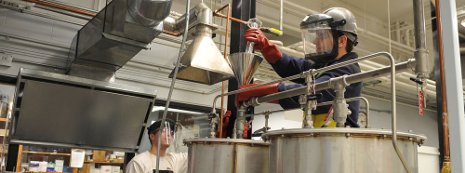Document Type
Article
Publication Date
12-2-2015
Abstract
Microbial cell wall-deconstructing enzymes are widely used in the food, wine, pulp and paper, textile, and detergent industries and will be heavily utilized by cellulosic biorefineries in the production of fuels and chemicals. Due to their ability to use freely available solar energy, genetically engineered bioenergy crops provide an attractive alternative to microbial bioreactors for the production of cell wall-deconstructing enzymes. This review article summarizes the efforts made within the last decade on the production of cell wall-deconstructing enzymes in planta for use in the deconstruction of lignocellulosic biomass. A number of strategies have been employed to increase enzyme yields and limit negative impacts on plant growth and development including targeting heterologous enzymes into specific subcellular compartments using signal peptides, using tissue-specific or inducible promoters to limit the expression of enzymes to certain portions of the plant or certain times, and fusion of amplification sequences upstream of the coding region to enhance expression. We also summarize methods that have been used to access and maintain activity of plant-generated enzymes when used in conjunction with thermochemical pretreatments for the production of lignocellulosic biofuels.
Publication Title
Plant Biotechnology Journal
Creative Commons License

This work is licensed under a Creative Commons Attribution 4.0 International License.
Recommended Citation
Park, S.,
Ong, R. G.,
&
Sticklen, M.
(2015).
Strategies for the production of cell wall-deconstructing enzymes in lignocellulosic biomass and their utilization for biofuel production.
Plant Biotechnology Journal,
14(6), 1329-1344.
http://doi.org/10.1111/pbi.12505
Retrieved from: https://digitalcommons.mtu.edu/chemical-fp/1
Version
Publisher's PDF


Publisher's Statement
© 2015 The Authors. Plant Biotechnology Journal published by Society for Experimental Biology and The Association of Applied Biologists and John Wiley & Sons Ltd. Deposited in compliance with publisher policies. Publisher's version of record: http://dx.doi.org/10.1111/pbi.12505